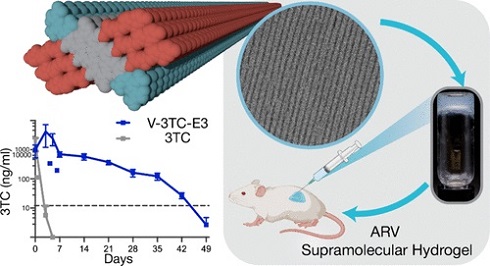HIV News: Johns Hopkins University Develops New Single Injectable Hydrogel That Delivers HIV Antivirals Over 42 Days!
Nikhil Prasad Fact checked by:Thailand Medical News Team Sep 26, 2023 2 years, 4 months, 2 weeks, 4 days, 2 hours, 3 minutes ago
HIV News: In a remarkable breakthrough, researchers at Johns Hopkins University have developed an innovative injectable hydrogel that has the potential to transform the treatment of HIV. This revolutionary hydrogel self-assembles under specific conditions and releases a controlled dose of the anti-HIV drug lamivudine over an extended period of six weeks. This development offers new hope to individuals living with HIV, promising a more convenient and effective alternative to the daily pill regimens currently in use.
 The Challenge of HIV Treatment
The Challenge of HIV Treatment
The management of HIV has long been a medical challenge due to the need for lifelong treatment to suppress the virus and prevent the development of AIDS. One of the primary hurdles in HIV therapy is maintaining consistent drug levels in the bloodstream, which is essential for effectively controlling the virus. Traditional treatment methods often require frequent dosing and different combinations of drugs to achieve this goal, making it challenging for patients to adhere to their medical regimens.
Injectable Hydrogel as a Game Changer
Lead researcher Dr Honggang Cui, a chemical and biomolecular engineer at Johns Hopkins University, and his team have shown that their injectable hydrogel could be a game-changer in HIV therapy. The hydrogel, when injected, quickly separates into lamivudine molecules, ensuring that a single injection can maintain therapeutic drug levels for an impressive 42 days with minimal side effects. This long-lasting effect eliminates the need for frequent dosing, addressing a significant challenge in HIV treatment.
Enhancing Quality of Life
Dr Cui emphasizes the goal of enhancing the quality of life for individuals living with HIV. The hydrogel offers a unique solution that can be injected beneath the skin, remaining in place over an extended period, gradually releasing the therapeutic compound. This sustained drug delivery is critical for individuals with HIV and could improve treatment adherence and overall outcomes.
Combination Therapy Potential
In addition to its potential use for lamivudine, the hydrogel platform could also serve as a promising method for combination therapies. HIV treatment often involves a cocktail of multiple drugs. Since lamivudine is an FDA-approved drug for both HIV and hepatitis B, the hydrogel could potentially aid in managing co-infections as well. This innovation is particularly significant as co-infection with hepatitis B is common among individuals with HIV, especially in regions like Asia and Africa.
Advantages Over Existing Injectable Treatments
Dr Charles W. Flexner, a co-author of the research and a professor at the Johns Hopkins School of Medicine, highlights the advantages of this new approach over existing injectable HIV treatments. Unlike current options that lack activity against hepatitis B, the hydrogel can deliver lamivudine, which is effective against both HIV and HBV. Furthermore, the platform can be adapted to deliver other drugs, such as tenofovir, which is the standard of care for HBV treatment.
Dr Flexner told
HIV News reporter
s from TMN, "This is a novel way to deliver anti-HIV meds, and this platform has the advantage that a single polymer can be programmed to deliver several different drugs simultaneously. One of the drawbacks of the approved injectable HIV treatments is that none have activity against hepatitis B virus, which is a common co-infection with HIV, especially in Asia and Africa. This formulation delivers lamivudine, a drug active against both HIV and HBV, but can also be modified to deliver tenofovir, which is the current standard of care for HBV treatment."
The Future of HIV Prevention
Beyond its use as a treatment, the research team envisions the hydrogel serving as a preventive measure. This concept is similar to how some individuals take anti-HIV drugs to reduce the risk of infection. Maintaining high drug levels in the plasma for 42 days is an impressive feat, and researchers are optimistic that future advancements could extend this duration even further.
The Science Behind the Hydrogel
Hydrogels are known for their unique water-absorbing properties, giving them a consistency similar to biological tissue. The newly developed hydrogel undergoes self-formulation, remaining near the injection site while breaking down into molecules that can combat the virus without the need for additional carriers or delivery materials. Notably, the gel filaments consist entirely of the therapeutic agent itself, simplifying the drug formulation process and potentially expediting regulatory approval once clinical efficacy is demonstrated.
Molecular Engineering for Supramolecular Polymers
To achieve this breakthrough, the researchers engaged in molecular engineering, turning lamivudine into the building blocks of a supramolecular polymer. This polymer consists of a chain of repeating molecules that can tightly bind together or disassemble based on external conditions such as temperature and pH. This clever design allows the hydrogel to form under physiological conditions and release the drug gradually, ensuring an extended therapeutic effect.
Conclusion
The development of the injectable hydrogel by researchers at Johns Hopkins University represents a significant leap forward in the field of HIV therapy. This innovative approach addresses key challenges in treatment, offering long-lasting drug delivery and the potential for combination therapies. Moreover, the hydrogel's ability to simplify the drug formulation process holds promise for expedited regulatory approval.
As researchers continue to explore the possibilities of this breakthrough, it may not only revolutionize HIV treatment but also become a powerful tool in HIV prevention. By offering a more convenient and effective treatment option, this injectable hydrogel brings hope for a brighter future for individuals living with HIV, potentially reducing the global burden of this devastating virus.
The study findings were published in the peer reviewed Journal of the American Chemical Society.
https://pubs.acs.org/doi/10.1021/jacs.3c05645
For the latest
HIV News, keep on logging to Thailand Medical News.
